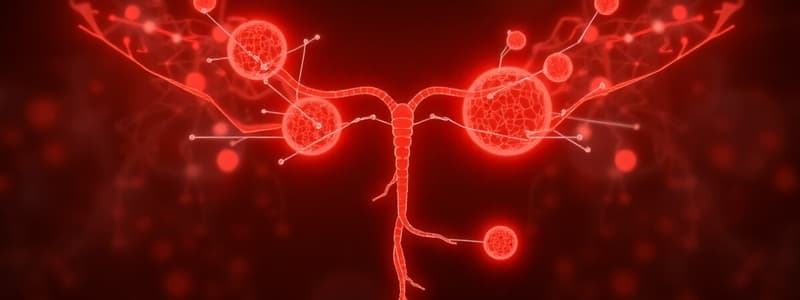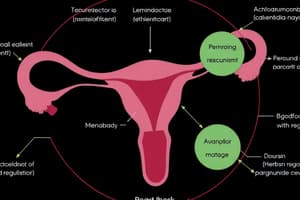Podcast
Questions and Answers
What occurs in the hypothalamus and pituitary during pregnancy regarding feedback loops?
What occurs in the hypothalamus and pituitary during pregnancy regarding feedback loops?
- Negative feedback decreases hormone production.
- Positive feedback increases hormone production. (correct)
- Feedback loops become entirely inactive.
- Hormonal production remains unchanged.
Which of the following best describes the concept of desensitization in hormone dynamics?
Which of the following best describes the concept of desensitization in hormone dynamics?
- Decreased hormone production in response to feedback.
- Decreased responsiveness due to prolonged or repeated exposure to a hormone. (correct)
- Increased hormone responsiveness due to environmental changes.
- Increased responsiveness to a hormone after prolonged exposure.
What was a significant finding from Berthold’s chicken experiment regarding testicular function?
What was a significant finding from Berthold’s chicken experiment regarding testicular function?
- Castration leads to permanent loss of male characteristics.
- Nerves are essential for testicular function.
- Testes extract can restore normal male development. (correct)
- Hormones have no effect if nerves are severed.
How does the set point of cortisol release vary between different environments?
How does the set point of cortisol release vary between different environments?
What effect does adrenaline have on glycogen metabolism during the fight or flight response?
What effect does adrenaline have on glycogen metabolism during the fight or flight response?
What is the primary role of receptors in the context of hormone action?
What is the primary role of receptors in the context of hormone action?
Which hormone group is characterized by being derived from amino acids?
Which hormone group is characterized by being derived from amino acids?
What occurs during the degradation of hormones in the bloodstream?
What occurs during the degradation of hormones in the bloodstream?
What was the primary outcome observed in Berthold’s chicken experiment regarding testicular function?
What was the primary outcome observed in Berthold’s chicken experiment regarding testicular function?
What is the primary effect of insulin on glucose metabolism?
What is the primary effect of insulin on glucose metabolism?
What is the significance of amplification in hormone signaling?
What is the significance of amplification in hormone signaling?
What physiological change occurs in a parabiosed mouse when connected to a normal mouse?
What physiological change occurs in a parabiosed mouse when connected to a normal mouse?
How can the same hormone cause different effects in various cell types?
How can the same hormone cause different effects in various cell types?
What characterizes endocrine glands?
What characterizes endocrine glands?
Which hormone is primarily involved in regulating blood calcium levels?
Which hormone is primarily involved in regulating blood calcium levels?
What is one function of glucocorticoids secreted by the adrenal cortex?
What is one function of glucocorticoids secreted by the adrenal cortex?
During which scenario does the feedback mechanism involving gonadal steroids become positive?
During which scenario does the feedback mechanism involving gonadal steroids become positive?
Which of the following is NOT a hormone secreted by the anterior pituitary gland?
Which of the following is NOT a hormone secreted by the anterior pituitary gland?
What role does insulin play in glucose regulation?
What role does insulin play in glucose regulation?
Which hormone is involved in decreasing hunger in response to blood glucose levels?
Which hormone is involved in decreasing hunger in response to blood glucose levels?
What gland is primarily responsible for hormone release that regulates metabolism and bone growth?
What gland is primarily responsible for hormone release that regulates metabolism and bone growth?
In the context of opposing signals, what effect does glucagon have?
In the context of opposing signals, what effect does glucagon have?
What is the impact of feedback loops in the endocrine system?
What is the impact of feedback loops in the endocrine system?
What characterizes primary hormone disorders?
What characterizes primary hormone disorders?
How are secondary and tertiary hormone disorders categorized?
How are secondary and tertiary hormone disorders categorized?
In primary hypothyroidism, which levels remain high?
In primary hypothyroidism, which levels remain high?
Which statement accurately describes the nervous and endocrine systems?
Which statement accurately describes the nervous and endocrine systems?
What is an autocrine action?
What is an autocrine action?
When endocrine and pituitary gland arrows are in the same direction, what type of disorder does this indicate?
When endocrine and pituitary gland arrows are in the same direction, what type of disorder does this indicate?
In secondary hypothyroidism, which of the following hormone levels are low?
In secondary hypothyroidism, which of the following hormone levels are low?
What distinguishes the effects of hormones in different parts of the body?
What distinguishes the effects of hormones in different parts of the body?
What defines paracrine action of hormones?
What defines paracrine action of hormones?
Which of the following is true regarding hormone-related diseases?
Which of the following is true regarding hormone-related diseases?
Flashcards
Negative Feedback Loop
Negative Feedback Loop
A mechanism where a hormone's action reduces its own further production, like a thermostat.
Set Point
Set Point
Hormone-mediated responses are adapted to specific environmental conditions, like the amount of cortisol needed in a beach vs. a city.
Modulation
Modulation
The process of fine-tuning hormone activity, often through changes in receptor sensitivity or expression.
Desensitization
Desensitization
Signup and view all the flashcards
Parabiosis
Parabiosis
Signup and view all the flashcards
Direct Neuroendocrine Action
Direct Neuroendocrine Action
Signup and view all the flashcards
Peptide and Protein Hormones
Peptide and Protein Hormones
Signup and view all the flashcards
Amino Acid Derivative Hormones
Amino Acid Derivative Hormones
Signup and view all the flashcards
Steroid Hormones
Steroid Hormones
Signup and view all the flashcards
Fatty Acid Derivative Hormones (Eicosanoids)
Fatty Acid Derivative Hormones (Eicosanoids)
Signup and view all the flashcards
Hormone Degradation and Excretion
Hormone Degradation and Excretion
Signup and view all the flashcards
Hormone Receptors
Hormone Receptors
Signup and view all the flashcards
Berthold's Chicken Experiment
Berthold's Chicken Experiment
Signup and view all the flashcards
Primary Endocrine Disorder
Primary Endocrine Disorder
Signup and view all the flashcards
Secondary Endocrine Disorder
Secondary Endocrine Disorder
Signup and view all the flashcards
Tertiary Endocrine Disorder
Tertiary Endocrine Disorder
Signup and view all the flashcards
Autocrine Action
Autocrine Action
Signup and view all the flashcards
Paracrine Action
Paracrine Action
Signup and view all the flashcards
Endocrine Action
Endocrine Action
Signup and view all the flashcards
Neuroendocrine Action
Neuroendocrine Action
Signup and view all the flashcards
What are exocrine glands?
What are exocrine glands?
Signup and view all the flashcards
What are endocrine glands?
What are endocrine glands?
Signup and view all the flashcards
What role does the hypothalamus play in the endocrine system?
What role does the hypothalamus play in the endocrine system?
Signup and view all the flashcards
What is the pituitary gland and what does it do?
What is the pituitary gland and what does it do?
Signup and view all the flashcards
What is the anterior pituitary?
What is the anterior pituitary?
Signup and view all the flashcards
What is the posterior pituitary?
What is the posterior pituitary?
Signup and view all the flashcards
What are gonads and what do they do?
What are gonads and what do they do?
Signup and view all the flashcards
What is the adrenal cortex and what does it do?
What is the adrenal cortex and what does it do?
Signup and view all the flashcards
What is the thyroid gland and what does it do?
What is the thyroid gland and what does it do?
Signup and view all the flashcards
What are the parathyroid glands and what do they do?
What are the parathyroid glands and what do they do?
Signup and view all the flashcards
Study Notes
Hormonal Regulation and Feedback Loops
- Hormonal feedback loops are typically negative, meaning a hormone's effect inhibits further release.
- Pregnancy is an exception, as the feedback loop becomes positive, boosting gonadal steroid production in the hypothalamus and pituitary.
- The hypothalamic-pituitary-adrenal (HPA) axis involves cortisol inhibiting ACTH, VP, and CRH.
- The hypothalamic-pituitary-gonadal (HPG) axis involves gonadal steroids inhibiting LH and FSH in the pituitary and GnRH in the hypothalamus.
- Exceptions exist during pregnancy, where the negative feedback loop becomes positive; gonadal steroids increase production in the hypothalamus and pituitary.
Set Point Variations
- The reference point for hormone levels varies by environment.
- An example comparison is between Hyde Park and Cancun, where cortisol levels needed to maintain equilibrium would differ. 500 units of cortisol might be excessive for Cancun but insufficient for Hyde Park.
Hormonal Modulation and Desensitization
- Modulation refers to fine-tuning hormone activity through expression or receptor sensitivity changes.
- Desensitization results from prolonged or repeated exposure to a hormone, decreasing its responsiveness.
- Insulin and adrenaline illustrate this: Insulin usually reduces glycogen phosphorylase activity and promotes glucose storage; adrenaline, during stress, reverses this effect via cAMP.
Early Endocrinology Experiments
- Berthold's experiment involved castrated chickens. Castration resulted in caponization, but reimplantation of testes restored the male characteristics.
- This showed that nerves weren't directly controlling testicular function; the testes' secretions were crucial.
- Parabiosis (connecting circulatory systems of animals) demonstrated the secretion's importance in restoring hormone equilibrium.
Parabiosis Studies
- Connecting a castrated mouse to a normal mouse through parabiosis demonstrated the role of gonadal secretions.
- The castrated mouse's gonads increased in size to stimulate hormone production and maintain equilibrium with the normal mouse.
- LH and FSH levels rose in the castrated mouse, resulting in higher levels in the normal one due to the feedback inhibition removal. This was driven by elevated levels of GnRH in the hypothalamus.
Studying That Suits You
Use AI to generate personalized quizzes and flashcards to suit your learning preferences.




